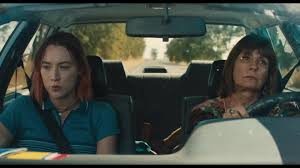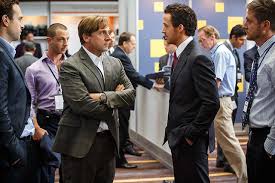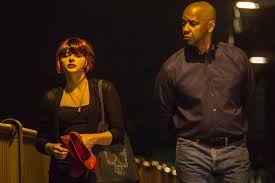MOTHER’S INFERIOR AND SUPERIOR: Movie Reviews of Lady Bird and Noviate by Howard Casner
Posted: December 17, 2017 | Author: Donald | Filed under: Uncategorized | Tags: Diana Agron, Greta Gerwig, Lady Bird, Laurie Metcalf, Lois Smith, Lucas Hedges, Margaret Betts, Melissa Leo, Novitiate, Saoirse Ronan, Timothée Chalamet, Tracy Letts | 3,835 Comments » First, a word from our sponsors: I am now offering a new consultation service: so much emphasis has been given lately to the importance of the opening of your screenplay, I now offer coverage for the first twenty pages at the cost of $20.00. For those who don’t want to have full coverage on their screenplay at this time, but want to know how well their script is working with the opening pages, this is perfect for you. I’ll help you not lose the reader on page one.
First, a word from our sponsors: I am now offering a new consultation service: so much emphasis has been given lately to the importance of the opening of your screenplay, I now offer coverage for the first twenty pages at the cost of $20.00. For those who don’t want to have full coverage on their screenplay at this time, but want to know how well their script is working with the opening pages, this is perfect for you. I’ll help you not lose the reader on page one.
Ever wonder what a reader for a contest or agency thinks when he reads your screenplay? FosCheck out my new e-book published on Amazon: Rantings and Ravings of a Screenplay Reader, including my series of essays, What I Learned Reading for Contests This Year, and my film reviews of 2013. Only $2.99. http://ow.ly/xN31r
and check out my Script Consultation Services: http://ow.ly/HPxKE
Warning: SPOILERS
 I think I will begin this review with a personal anecdote. Years ago, I was in the audience for one of the final previews for Stephen Sondheim’s musical Merrily We Roll Along, a tale told in reverse about three friends who betray the ideals they had when just starting out. It was a disaster. An unmitigated one at that. And it closed, I believe, around two weeks after it opened, if it lasted that long.
I think I will begin this review with a personal anecdote. Years ago, I was in the audience for one of the final previews for Stephen Sondheim’s musical Merrily We Roll Along, a tale told in reverse about three friends who betray the ideals they had when just starting out. It was a disaster. An unmitigated one at that. And it closed, I believe, around two weeks after it opened, if it lasted that long.
It was so terrible, I though the songs, with a couple of exceptions, were not just Sondheim’s worst, they were just bad.
A year later, I was in the cutout section of a record store (remember those?) and I ran across a cast recording for the show. I bought it and listened to it anew and realized the songs were wonderful and that it had been the production that was, well, let us be kind and say…lacking. Read the rest of this entry »
A BIT SHORT: The Big Short and The Hateful Eight
Posted: December 23, 2015 | Author: Donald | Filed under: Uncategorized | Tags: Adam McKay, Brad Pitt, Bruce Dern, Channing Tatum, Charles Randolph, Christian Bale, Damian Bichir, Ennio Morricone, Jennifer Jason Leigh, Karen Gillan, Kurt Russell, Melissa Leo, Michael Lewis, Michael Madsen, Quentin Tarantino, Ryan Gosling, Samuel L. Jackson, Steve Carrell, The Big Short, The Hateful Eight, Tim Roth, Walton Goggins | 1,892 Comments »First, a word from our sponsors: I am now offering a new service: so much emphasis has been given lately to the importance of the opening of your screenplay, I now offer coverage for the first twenty pages at the cost of $20.00. For those who don’t want to have full coverage on their screenplay at this time, but want to know how well their script is working with the opening pages, this is perfect for you. I’ll help you not lose the reader on page one.
Ever wonder what a reader for a contest or agency thinks when he reads your screenplay? Check out my new e-book published on Amazon: Rantings and Ravings of a Screenplay Reader, including my series of essays, What I Learned Reading for Contests This Year, and my film reviews of 2013. Only $2.99. http://ow.ly/xN31r
and check out my Script Consultation Services: http://ow.ly/HPxKE
Warning: SPOILERS
 The Big Short, like Spotlight, is the one of those movies ripped from the headlines—of years and years ago; but this time the subject is not pedophile priests, but the downfall of the American economy. Written by Charles Randolph and the director Adam McKay, from a book by Michael Lewis, it’s also a very satisfying bit of agitprop theater with Brechtian distancing devices thrown in for good major.
The Big Short, like Spotlight, is the one of those movies ripped from the headlines—of years and years ago; but this time the subject is not pedophile priests, but the downfall of the American economy. Written by Charles Randolph and the director Adam McKay, from a book by Michael Lewis, it’s also a very satisfying bit of agitprop theater with Brechtian distancing devices thrown in for good major.
It basically tells the story of four different groups of people who all realized, more or less at the same time, and years ahead of schedule, that the housing mortgage bubble was going to burst in 2007 and destroy the world’s economy.
This leads to the movie’s major irony: the people who figured this out then proceed to invest heavily against the U.S. economy, making tons of money when their Cassandra like prediction of doom came true.
So basically, we in the audience, along with the characters in the movie, find ourselves and themselves actually hoping that the U.S. financial system tanks like the Titanic. Read the rest of this entry »
THE RUSSIANS ARE COMING, THE RUSSIANS ARE COMING: Movie review of The Equalizer by Howard Casner
Posted: October 11, 2014 | Author: Donald | Filed under: Uncategorized | Tags: Antoine Fuqua, Bill Pullman, Chloȅ Grace Moretz, David Harbour, Denzel Washington, Edward Woodward, Marton Czokas, Melissa Leo, Michael Sloan, Richard Lindheim, Richard Wenk, The Equalizer | 1 Comment »First, a word from our sponsors. Ever wonder what a reader for a contest or agency thinks when he reads your screenplay? Check out my new e-book published on Amazon: Rantings and Ravings of a Screenplay Reader, including my series of essays, What I Learned Reading for Contests This Year, and my film reviews of 2013. Only $2.99. http://ow.ly/xN31r
Warning: SPOILERS
 As I was viewing The Equalizer, the new origin film (because that is what it is; it’s not an Equalizer movie, but how the central character becomes the who you gonna call, or in this case, contact via craigslist.com, crime fighter) written by Richard Wenk (from the 1980’s television series starring Edward Woodward and created by Michael Sloan and Richard Lindheim) and directed by Antoine Fuqua and starring Denzel Washington who won the Oscar when Fuqua directed him in Training Day and…
As I was viewing The Equalizer, the new origin film (because that is what it is; it’s not an Equalizer movie, but how the central character becomes the who you gonna call, or in this case, contact via craigslist.com, crime fighter) written by Richard Wenk (from the 1980’s television series starring Edward Woodward and created by Michael Sloan and Richard Lindheim) and directed by Antoine Fuqua and starring Denzel Washington who won the Oscar when Fuqua directed him in Training Day and…
Anyway, as I was saying, while I was watching the film, the same thought kept occurring to me:
The more things change, the more things stay the same. Read the rest of this entry »
Movie Review of PRISONERS by Howard Casner
Posted: September 15, 2013 | Author: Donald | Filed under: Uncategorized | Tags: Aaron Guzikowski, Denis Villenvue, Hugh jackman, Jake Gyllenhaal, Len Cariou, Mario Bello, Melissa Leo, Paul Dano, Prisoners, Terrence Howard, Viola Davis, Wayne Duvall | 5 Comments »For the 2011 Oscars, Canadian director Denis Villenvue’s film Incendies (a puzzle film about twin brother and sister who find out they are closer to their unknown father and brother than they thought) was nominated for best foreign language film. In punishment for his sins, Villenvue was given the movie Prisoners to make.
Actually, I don’t know if this is accurate or not. As far as I really know, this was Villenvue’s pet project from beginning to end. But it sure feels like proof of that anecdote by Michael Haneke who came to the U.S. and was presented with a screenplay so outside his purview, he asked (and I paraphrase), “Is this what Hollywood is? You come here and they just give you whatever screenplay they have lying around in a drawer” (a viewpoint that seemed proven as far as I was concerned when the dynamic Korean filmmaker Chan-wook Park was given the embarrassing screenplay of Stoker to make).
There is one good scene in Prisoners, a routine thriller about child abduction written by relatively newcomer Aaron Guzikowski. It comes early on with Jake Gyllenhaal as Detective Loki (Loki? Okay, sure, why not) interacting with a waitress at a Chinese restaurant. They talk about animal signs and fortune cookies and it has nothing to do with anything, but it is witty and fun. But after that (and before that as well), everything goes downhill rather quickly. It plays with religious imagery, but that all feels clichéd and under dramatized. And the movie brings nothing new to the genre, seeming to have no real purpose for existence, even the purpose of a movie that does nothing, but does it very, very well.
Prisoners is a one note film. It starts at a relatively high point of tension (even before anything happens) and pretty much stays there the whole time. Everyone seems so angry in the film. Hugh Jackman, trying a bit too hard to play against type as everyman working class father Dover, feels angry from the opening shot (both literally and figuratively, but you’ll have to see the movie to get the pun). And the scenes with Loki at the police station are so filled with furious confrontation, it feels like an episode of Law & Order: SVU (I never knew how anyone could stand working with anyone in that show, they were all so unprofessionally mean to each other). Even the weather is angry; it’s always overcast, raining or snowing. And when there’s no place for anyone to go, when they do go there, it tends to become camp, over the top and unintentionally funny.
There’s only one really effective performance in the move and that is Wayne Duvall as the Captain at Loki’s precinct. He’s one of those, I know I’ve seen him a million times before, though I can’t quite place where, actor. And he is spot on. But everyone else, Jackman, Terrence Howard, Viola Davis, the unrecognizable Melissa Leo and Len Cariou (or maybe I just didn’t want to recognize them), and the unfortunately recognizable Paul Dano, just can’t do much with what they’re given. At least Mario Bello, as Dover’s wife, is lucky enough to have a character so traumatized she takes sleeping pills and is out for most of the film.
Because I and my friends could never become emotionally involved in the movie (though our eyebrows got plenty of exercise as we rolled them over and over again), all that was left for us was to wait, and wait…and wait, until we find out who did it. And because we could never become emotionally involved, all we did afterwards was pick apart the plot (a highly convoluted one by the time it’s over, a bit too clever perhaps than was necessary, but it did seem to hold together). If we had been riveted by what was going on and so involved with the characters and what they were going through, we probably wouldn’t have cared about the details so much (especially a particularly hysterical one at the end where Loki has the choice of calling 911 for help or speeding to get a little girl to a hospital down a crowded freeway during a deluge of a rainstorm while in danger of blacking out from being shot—guess which one he chooses?).
I do hope that as far as Villenvue is concerned, this was a take the money and run movie and that he’ll next return to his roots and make something that means something to him and not to some producer’s profit sheet. We can only hope.
Movie Review of OBLIVION and THE ATTACK by Howard Casner
Posted: April 25, 2013 | Author: Donald | Filed under: Uncategorized | Tags: Ali Suliman, Anthony Gonzales, Darren Gilford, Joelle Touma, Joseph Kosinski, Joseph Trapanese, Karl Gadjusek, M83, Melissa Leo, Michael Ardnt, Morgan Freeman, Oblivion, The Attack, Tom Cruise, Ziad Doueiri | 2 Comments »Oblivion is the new Tom Cruise sci-fi blockbuster, a description that may seem triply redundant. Basically, it’s a bunch of “who didn’t see that coming” and a couple of “no real surprises there” and a few too many turnings to my friend and asking, “do you have any idea what’s going on here” (his reply, “I think so”, probably isn’t the sort of confident response the writers, Joseph Kosinski—who also directed, Karl Gadjusek and Michael Ardnt, were hoping for, though in their defense I don’t know whether I found the story hard to follow because it’s convolutedly written; or because I was so bored my mind kept wandering and I missed a plot point here and there; or both).
The basic premise has to do with some sort of yadda, yadda, yadda in which the earth it attacked by aliens and the moon is blown up making the earth uninhabitable. After winning the war the people of earth moved to…no, you know what? Forget it. I’m sorry, but I’m not going to summarize it. It’s just not worth it the money they’re paying me (okay, no one’s paying me anything, but it isn’t worth the money they would pay me if they were paying me, which they aren’t, so…).
Anyway, suffice it to say that our world is now one of those apocalyptic wastelands. But even worse, it’s now filled with bland characters saying bland things in a bland plot. I’d say the CGI is stunning, but we’re now grading on a curve and it’s no worse and no better than any other recent apocalyptic film (though I think the scenes of Cruise on a motorcycle speeding across the New York City desert looked a bit, well, cheesy to me). The thumping, thunderous music by Anthony Gonzales, M.8.3. and Joseph Trapanese may not be great or original, but it’s nice to have someone trying to create a little tension here. The production design by Darren Gilford includes a streamlined, glass house suspended in the sky (I’d say it was designed by Frank Lloyd Wright, but this one is an engineering marvel). The cast includes Melissa Leo and Morgan Freeman for reasons as impenetrable as the plot (I hope it was for the paycheck).
The ending is a bit odd. For a movie that seems to want to hold up the uniqueness of man and the importance of their survival, it finales on the dubious moral note (and a rather offensive one to me) that the death of a man is irrelevant as long as he has a clone hanging around. It’s also borderline ludicrous since all I could think is “boy, is Julia…” (oh, right, uh, see, Julia is this character who..okay, she’s, uh…no, you know what, again, forget it, I’m not going to explain this part of the plot either), “boy, is Julia going to be surprised when all the other Tom Cruises show up”. I could also make a joke about Tom Cruise and clones and isn’t he one already, etc., but I won’t since that sort of humor is beneath me.
If you must see an apocalyptic movie, don’t see this one, see It’s a Disaster. Even if you musn’t see an apocalyptic movie, see It’s a Disaster.
What would do if you discovered out of nowhere and with no hint or clue to prepare you that your spouse was a terrorist. No, take it a step further. What would you do if he or she is a suicide bomber and has just killed a large number of people, including children? That’s the basic premise of the new, breathtaking drama, The Attack.
Amin Jaafari is a Palestinian and a secular Muslim fully integrated into Israeli society. He’s also a celebrated and well known doctor working at a major hospital. The story begins with him receiving the most prestigious award one can receive as a doctor. The next day, after a bomb explodes, he’s on the front lines in the ER, refusing to let even one child die. He’s a saint. No, the writers Ziad Doueiri, who also directed, and Joelle Touma are trying to do a little bit more here. Amin is a credit to his race. At the award ceremony he gives a speech Hattie McDaniel would have been proud of at the 1939 Oscars. He’s Sidney Poitier in Guess Who’s coming to Dinner. And though you like and admire him, there is also something about this noble doctor that makes you squirm just a little bit.
And then it happens. After the blast and the hard day in the ER, Amin is called back to the hospital to identify a body; his wife, who is suspected of being the person who set off the bomb that sent all the people to the hospital that he saved. He’s then taken in for questioning, but eventually released when it seems clear he had no idea that his wife was involved in anything. The story is then about his trying to understand why his wife would do what she did.
The Attack is not a perfect film. It has structural issues. When Amin finds out about his wife, he has to go through the denial stage of death twice. First he has to accept that his wife is dead, then he has to accept that she did what the authorities claim she did. This slows the pacing down a bit because until he does that, he can’t go on his Citizen Kane/Mask of Dimitrios quest of going from person to person to find the answers he needs The result is a middle section that tends to stall for awhile. But the forward momentum soon recovers, grabbing you like the first part of the movie does, refusing to let go.
Amin is played by Ali Suliman who gives a masterful and deeply empathetic performance as the beleaguered doctor. By the end, his character is abandoned by everyone, both the Palestinians whose cause is not his cause, and the Israelis who claimed they would never desert him, but eventually make him realize that he will always be a Palestinian to them.
The Attack is a movie that should be seen. Oblivion is one that should not.
Tell me what you think.
Review of the Movie FLIGHT by Howard Casner
Posted: November 24, 2012 | Author: Donald | Filed under: Uncategorized | Tags: Denzel Washington, Don Cheadle, flight movie, John Gatins, John Goodman, Melissa Leo, Peter Gerety, Robert Zemeckis | 9,427 Comments »Flight, the new film from writer John Gatins and director Robert Zemeckis, has an incredible set piece near the beginning of the movie in which a pilot (Denzel Washington) is forced to crash land a plane in nightmare conditions by making it roll 360 degrees (flying upside down for awhile) and coming down on a field near a church about ready to do some Sunday go to meeting baptisms. It’s an amazing technical feat (and not just the landing, but the filming as well) and it’s an exhilarating start. When this section is over, the movie sets up an equally incredible enigma: Whip, the pilot, was drunk and had cocaine in his system when he performed this unbelievable stunt; but that wasn’t the cause of the crash. And Whip’s handling of the landing was something that ten other pilots couldn’t have done sober. So the whole movie seems more than ready to tackle issues and questions brought up by this fascinating conundrum.
And then the movie becomes…something else, something else entirely, and something that has nothing to do with either the crash landing or what sort of punishment should be given to a pilot who is able to make a miraculous landing (Gatins’ words, not mine) while drunk. It actually becomes a rather routine, formulaic The Lost Weekend, The Days of Wine and Roses, When a Man Loves a Woman, Clean and Sober (fill in with your favorite film in the genre) story about an alcoholic.
Six people died in the crash and a huge number of people were seriously injured. But is this their story or is the story about the crash and what it means? No. Believe it or not, all of this is chopped liver. All of this is a macguffin, because the only reason for any of this, the only purpose for all these deaths, the only purpose of the crash, the only reason for all this destruction is so that Whip will start going to AA.
I’m not kidding. I am totally serious. And to back up this idea, there’s a ton of talk about God in the movie and whether everything is preordained or has a purpose, whether everything that happens is just part of an overall plan. To be fair, all this mention of God at times tends to be a bit metaphorical in that whenever the big guy’s name is mentioned, He’s a stand in for all the unforeseen and uncontrollable things that happen in life, as when destruction from a hurricane is an “act of God”. But still.
And it’s not that the movie is without its positive aspects. But oddly enough, it’s not when the film focuses on Whip’s journey, but when it focuses on the issues related to the crash that the movie really comes to life. Both Don Cheadle, as a long suffering lawyer, and Peter Gerety, as the owner of the airline, stand out as the few who really seem to understand what is really going on and that the meaning of the crash is the crash and that Whip’s journey is actually a hindrance and just getting in the way of the real issues. When Gerety tells everybody off, I thought, finally, someone who really gets what it’s all about.
Washington is fine as Whip, but he’s always a lot more fun when he’s playing anti-heroes like here, people you would not want to meet in a darkened alleyway. Melissa Leo also makes her mark at the end because, like Cheadle and Gerety, she’s in a different movie. The low point, though, has to be John Goodman as Whip’s connection. Goodman is one of our finest character actors, but here, as in Argo and some other recent films, he’s been reduced to playing, well, John Goodman roles, and he deserves better.
In all fairness, I should point out that many in the audience around me were deeply moved. But I just couldn’t join in. For me, if truth be told, I was bit offended. Here I thought that Leibnitz and the philosophy of “the best of all possible worlds” ended with Voltaire’s ruthless satire Voltaire. But apparently not. No matter how awful things are, no matter how many people die, no matter how much destruction there is, it’s okay, because there’s always a silver lining. People can die, but their death has meaning because it helped someone enter a recovery program. Really.











